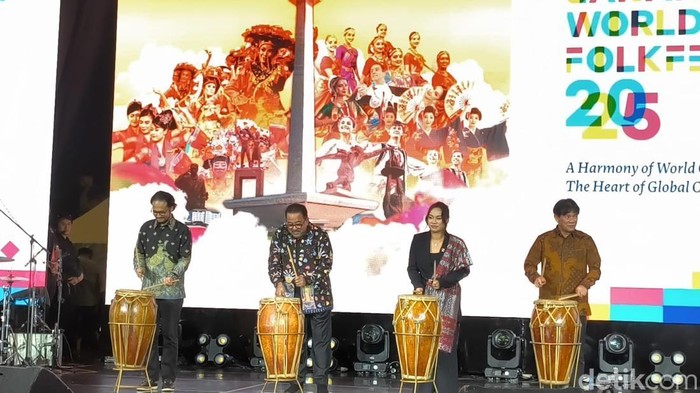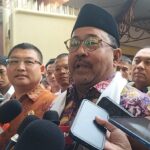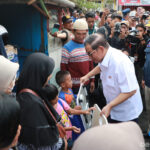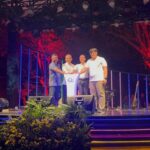Jakarta –
The Jakarta World Folk Festival (JWFF) 2025 has concluded. Deputy Governor of Jakarta Rano Karno plans to continue organizing the same event annually.
“I actually didn’t want to close this event. It’s not yet at its full potential—not yet. The full version will come in 2027, when we invite 82 countries to Indonesia, so that Indonesia, or Jakarta, can become a global city,” said Rano Karno during the closing ceremony of JWFF 2025 at Senayan Park, Central Jakarta.
Rano considered the event a success. He hopes that by Indonesia’s 500th anniversary in 2027, cultures from all over the world can perform and enliven JWFF.
“Welcome to Jakarta. May this visit be memorable, and I hope next year you can come again—and certainly in 2027, when Jakarta turns 500, we will bring the world to Jakarta,” Rano said.
Rano acknowledged that there were still shortcomings in the event. His team will evaluate and improve for next year’s edition.
“Of course, this first edition wasn’t perfect, but we will revise it soon so that the event can become much better year after year,” he said.
The closing ceremony of JWFF 2025 was conducted jointly by Rano Karno, the Presidential Special Envoy for Tourism Zita Anjani, the President of the International Council of Organizations of Folklore Festivals and Folk Arts (CIOFF) Indonesia Said Rachmat, and the Deputy Mayor of Cilegon Fajar Hadi Prabowo.
The event concluded with a collective performance of Rampak Gendang drumming. The festivities continued with cultural performances by delegates from Bulgaria, Russia, India, South Korea, Japan, and of course, Indonesia.
Jakarta World Folk Festival (JWFF) 2025
The **Jakarta World Folk Festival (JWFF) 2025** is an international cultural event celebrating traditional music, dance, and arts from around the world. Held in Jakarta, Indonesia, the festival aims to promote global cultural exchange and preserve folk heritage. The 2025 edition continues its legacy of bringing together diverse performers and audiences, fostering unity through shared artistic traditions.
Senayan Park
Senayan Park, located in Jakarta, Indonesia, is a popular urban park known for its sports facilities and green spaces. Originally developed in the 1960s as part of the Senayan Sports Complex for the 1962 Asian Games, it has since become a recreational hub for locals and visitors. The park features jogging tracks, playgrounds, and open areas for events, blending modern amenities with historical significance as a legacy of Indonesia’s sporting heritage.
Indonesia
Indonesia is the world’s largest archipelago, comprising over 17,000 islands, and is known for its rich cultural diversity, vibrant traditions, and stunning natural landscapes. Historically, it was a hub of ancient Hindu-Buddhist kingdoms, such as Srivijaya and Majapahit, before the spread of Islam in the 13th–16th centuries and later Dutch colonization. Today, it is a multicultural nation with over 300 ethnic groups, famous for sites like Borobudur Temple, Bali’s beaches, and Komodo National Park.
Jakarta
Jakarta, the capital city of Indonesia, is a bustling metropolis with a rich history dating back to the 4th century as a Hindu port city. It later became a major trading hub under Dutch colonial rule in the 17th century, known as Batavia. Today, Jakarta is a vibrant cultural and economic center, blending modern skyscrapers with historic landmarks like the Old Town (Kota Tua) and the National Monument (Monas).
Central Jakarta
Central Jakarta is the political and economic heart of Indonesia’s capital, home to key government buildings, monuments, and business districts. Established during Dutch colonial rule as Batavia’s administrative center, it later became the focal point of Indonesia’s independence movement. Today, it features landmarks like the National Monument (Monas) and Merdeka Palace, blending colonial heritage with modern development.
International Council of Organizations of Folklore Festivals and Folk Arts (CIOFF)
The International Council of Organizations of Folklore Festivals and Folk Arts (CIOFF) is a UNESCO-affiliated NGO founded in 1970 to promote traditional culture and folk arts worldwide. It organizes festivals, workshops, and heritage preservation programs, fostering intercultural exchange. Recognized by UNESCO in 2005, CIOFF plays a key role in safeguarding intangible cultural heritage.
Cilegon
Cilegon is an industrial city located in Banten Province, Indonesia, known for its significant role in the country’s steel production, particularly through the state-owned company Krakatau Steel. Historically, the area was part of the Banten Sultanate before developing into a major industrial hub in the late 20th century. Today, it serves as a key economic center while also offering access to nearby cultural and natural attractions, such as the ancient Surosowan Palace and the Ujung Kulon National Park.
Rampak Gendang
Rampak Gendang is a traditional Indonesian musical performance from West Java, featuring synchronized drumming (kendang) by a group of musicians. Originating from Sundanese culture, it combines rhythmic percussion with dynamic movements, often performed at festivals and cultural events. The art form highlights communal harmony and the rich musical heritage of the Sundanese people.






